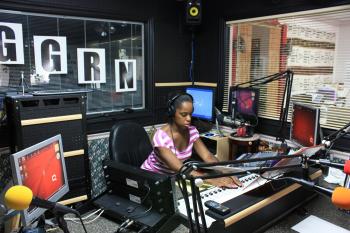Low Country Community Radio

Gullah People's Movement - Radio for the Low Country
When Jabari Moketsi finally gets his low power radio station on the air in Beaufort, S.C., the first program on his schedule will be hosted by octogenarians. The show, entitled “Keepers of the Culture,” will provide an oral history of the African-American community in lowcountry South Carolina and Georgia, who are often referred to as Gullah or Geechee. Though Brother Jabari plans to feature other music, news, and public affairs programming, all of it will serve the same purpose of preserving and strengthening Gullah culture, and sharing it with the rest of the community.
Though Gullah culture was developed by West African slaves on the rice fields of the southeastern U.S. coast, it still exists today in the food, medicine, folk stories, spiritual practices, and speech of many African-Americans on the coastal plains and Sea Islands of South Carolina. By celebrating this distinct culture over the airwaves, Moketsi hopes to enhance education about the Gullah community, as well as within it. As a result, public affairs programming will not only be designed to educate members of the Gullah community on issues concerning health, culture, and economics, but will also serve to promote tourism and encourage government officials to engage with their Gullah constituents.
“We'll be able to speak to power, as well as empower,” Brother Jabari said.
“You have powerful entities in a community, but some people don't have a way to speak to them from a mass point of view. But with a radio station, you have a vehicle to hold those entities accountable, and in doing that, you empower the people in the community.”
Though Moketsi is able to use his three decades of radio experience to train all of the volunteers at the online Gullah Geechee Radio Network, his vision for a successful low power station requires involvement and contributions from the entire community. To generate this kind of widespread support and attract volunteers, his organization has held meetings at various local churches and picnics with free hot dogs and soda at neighborhood parks. They've also managed to raise their profile, as well as funds, with community events like fish fries and car washes. Though the Gullah Geechee Radio Network already owns most of the studio equipment needed to start a community station, the benefit of these events extends far beyond the money they raise.
“We don't really need to have those fish fries and things just for the money, but we want to be truly involved with the community. There are plenty of big stations in the area, but they don't know what's going on in the community. They don't even know that you're alive,” Moketsi explained.
Indeed, if Moketsi finally gets his license to build a Gullah community station, it would be the first of its kind in his home county of Beaufort. After decades of listening to local radio that ignored the concerns and contribution of its Gullah listerners, Brother Jabari has rallied a community that is primed and ready take to the airwaves.
“We're not going to be just a footnote in someone else's story,” Moketsi maintained.
